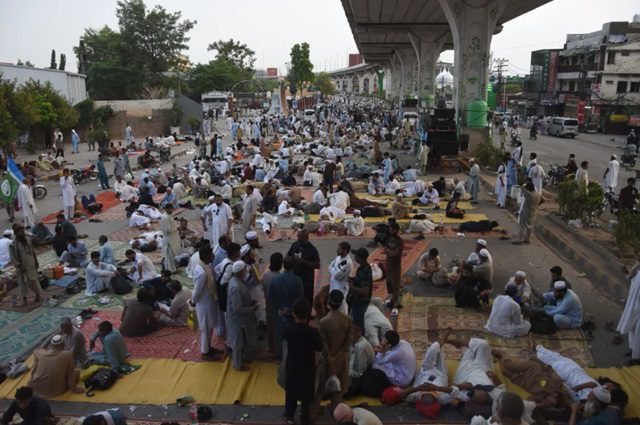BTN News: Protests have broken out in Pakistan as people express anger over the sharp rise in electricity bills. Around 3,000 supporters of a major Islamist party blocked a key highway leading to Islamabad, the capital. These demonstrators, not deterred by the heavy monsoon rains, have been sitting on the road since Friday in the city of Rawalpindi. They are demanding that the government remove the taxes on electricity, which have caused the recent steep price hikes.
The protesters waved the white, blue, and green flags of the Jamaat-e-Islami party. They chanted slogans against the increased electricity charges, saying, “This cruel increase in the electricity bill is not acceptable.” The government has had meetings with the protest leaders but has not shown any sign of agreeing to their demands.
Naeem-ur-Rehman, the leader of Jamaat-e-Islami, said he is ready to continue the protest for as long as it takes. The government recently raised electricity prices by 26% in the last fiscal year, which ended on June 30. Then, on July 13, they imposed another 20% increase. These actions have caused widespread dissatisfaction. Officials claim these increases are necessary to meet the conditions set by the International Monetary Fund (IMF) for a $7 billion loan agreement made this month.
The government has also added many confusing taxes to the basic price of electricity. This means that some people in Pakistan are paying more than double what they used to. For example, Asma Humayon, a teacher at a private school in Lahore, said her electricity bill went from 10,000 rupees ($36) in May to 22,000 rupees ($80) this month. The sharp rise in energy costs is putting a lot of strain on household budgets. People are finding it hard to manage their daily expenses because of the high electricity bills.
In Lahore, hundreds of Jamaat-e-Islami supporters, mostly women, also marched to protest against the electricity price hikes. Sahiba Bibi, who lives on the outskirts of Islamabad, said she would have to sell one of her two goats to pay a bill of 18,000 rupees ($65). She asked, “But what will happen when I no longer have my other goat?” This shows how desperate people are becoming due to the high electricity costs.
Umar Draz, a fruit vendor in Peshawar, said he has been borrowing money to pay his utility bills since last year. “But now, people are not willing to lend me money. I know that at some point, they will cut off my electricity,” he said. This reflects the growing financial troubles many are facing.
Economist Ashfaque Hasan said that the high electricity costs are partly due to deals made in the 1990s between the government and private power companies to buy energy at high prices. Hasan remarked, “Pakistan and these independent power producers cannot coexist.” This highlights a long-term issue contributing to the current crisis.
Khaleeq Kiani, a journalist who writes about Pakistan’s economy, suggested that the best way to deal with the rising electricity prices is to install solar panels. “People will be unhappy again when they get their electricity bills in August,” Kiani warned. This implies that the problem is not going away soon.
In recent years, many Pakistanis have started using solar panels to avoid high electricity bills and power outages. However, not everyone can afford the initial cost of solar equipment. This solution, while effective for some, is not accessible to all.
The ongoing protests show the deep frustration and financial hardship many Pakistanis are experiencing. The government’s policies and economic challenges are causing widespread distress. This situation highlights the urgent need for sustainable solutions to the country’s energy crisis and broader economic problems affecting its people.


